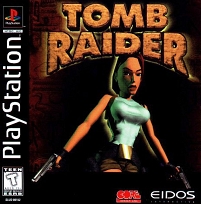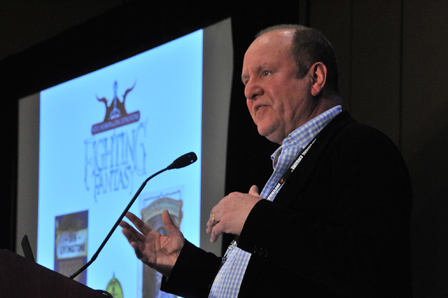Erstellt am: 20. 6. 2016 - 17:35 Uhr
Dungeons, Dragons und das Smartphone
Vor mittlerweile 20 Jahren erschien der erste Teil des Videospiels "Tomb Raider". Sozusagen einer der Geburtshelfer von Lara Croft ist der britische Videospiel-Pionier Ian Livingstone. Er war seinerzeit beim Videospiel-Verleger Eidos, die die ersten Tomb-Raider-Spiele veröffentlichten.

Eidos
"This (Anm.: Tomb Raider) is the first game with a 3D character in a 3D world moving into the screen instead of moving alongside it. Why not have a female character? But let's not be too stereotypical about this character. Let's make this a very powerful respected character so Lara Croft should be very strong, independent, intelligent, didn't really need men, a strong archaeologist. And it really resonated with everybody and some 30% of people who bought Tomb Raider were females. So I am very delighted that Lara Croft survived the test of time the same way James Bond has survived in the cinema", sagt Livingstone im Interview.
Die WG wird zum Büro, der steinige Weg zur eigenen Firma
Seine Reise in die Welt der Spiele begann vor über 40 Jahren, als er beschloss, sein Hobby zum Beruf zu machen. Gemeinsam mit seinen WG-Kollegen John Peake und Steve Jackson wagte er den Sprung in die Selbstständigkeit. Ihre Passion: Spiele. Ihre Vision: Eine europäische Spiele-Community zu schaffen.
"I turned my hobby of playing games into the business of making them. Our Company was called "games workshop". We published a newsletter which of course was pre-digital, it was the analogue world and we were sent a copy of "Dungeons and Dragons" by its inventor Gary Gygax who had seen our newsletter. We played it and it was imagination going crazy. It's a role playing game where you pick on the roles of wizards and heroes and these fantastical journeys. An endless game and all in the comfort of your own living room. It was very exciting by the time. So we became the distributors of "Dungeons and Dragons."

CC BY-SA 2.0, Official GDC/The Photo Group on Flickr
Kein Geld, umso mehr Enthusiasmus
Schon seinerzeit, als die Spiele-Enthusiasten die erste Version von "Dungeons and Dragons" zusammen mit ihren gerade mal 400 Newslettern verschickten, war die Nachfrage immens. Die Wohngemeinschaft, die bis dato auch als Büro und Vertriebsraum gedient hatte, wurde zu klein. So entstand 1978 das erste Büro ihrer Firma "Games Workshop". Heute zählt das Unternehmen über 600 Mitarbeiter und verzeichnete 2014 ein Netto-Einkommen von über acht Millionen Britische Pfund. Zur Gründungszeit, vor rund 38 Jahren, kämpften die drei jungen Männer allerdings noch um ihre Existenz.
Livingstone blickt zurück: "Well it was a very difficult situation in the early days. It happened I had to sleep in a van for 3 month because it was impossible to raise finance for Games Workshop. So me and my business partner parked the van outside the office and we'd start with a game of squash so we could have a shower to shave which is conveniently located next door to our office. Then we were in there for 12 hours doing mail orders, writing our newsletters and just talking about our hobby. We probably made lots of mistakes, but it didn't matter, because we didn't have any competition. But that were very exciting days and of course today games are a very huge industry."
Exklusivverträge um sein Spiel zu finanzieren - Fluch, oder Segen?
Im Milliardengeschäft der Spieleindustrie samt ihren Blockbustern taucht der Name Ian Livingstone immer wieder auf. Zum Beispiel als Erfinder des sogenannten interaktiven Buches. Seine "Fighting Fantasy"-Serie stellt Leserinnen und Leser immer wieder vor die Wahl, welche Entscheidung der Protagonist treffen soll. Dementsprechend geht der Roman auf immer anderen Seiten des Buches weiter - ein Konzept, das aus Videospielen nicht mehr wegzudenken ist.
Neben Kreativität und Innovation geht es aber gerade bei Videospielen um Geld. Je kleiner eine Firma, desto wichtiger sind mitunter auch Exklusiv-Verträge mit Plattform-Herstellern, um die Entwicklung ihres Titels finanzieren zu können. So muss man sich aber auch nach bestimmten Vorgaben und Wünschen des Investors richten. Für Ian Lvingstone ist das aber weniger ein Pakt mit dem Teufel, als eine wichtige Erfahrung im Leben eines Spiele-Entwicklers:
"It's always a financial consideration. I mean ultimately all developers would like to be independent to have enough of their own money to be publisher yourself and determine their own destiny. But as we know, many developers are not in that position and they have to effectively loose exclusivity on their intellectual property in return for project finance and that's part of the learning process. If they're successful doing that ultimately they'll be successful in the position to raise their own money to leverage their content through every platform without having to do specific exclusive deals."
"Between radio and television I prefer radio, because the pictures are better"
Von der Grafik bis hin zur Plattform, ob Exklusivverträge oder Finanzierung durch Kickstarterprojekte: die Möglichkeiten, die es für Spiele-Entwickler heutzutage gibt, ihre Ideen umzusetzen, faszinieren den 66-jährigen Videospielpionier:
"The game industry evolves through advanced technology like no other industry. Every year there is a new platform announced. Then there is mobile games. Virtual Reality is coming. All these are great opportunities for game makers to do new games and find new audiences playing in new ways. And that's the exciting thing. That's the challenge and the opportunity. Back in the day in 1975 the main platform was your imagination. And I remember I had a great conversation with Gary Gygax who created "Dungeons and Dragons". He said to me "oh between radio and television he prefers radio, because the pictures are better. So nothing is right but something is righter for everybody it's just up to the individual to find their own particular favorite way of playing games."
Smartphones treiben klassische Konsolen ins Abseits
Neben seiner nach wie vor andauernden Passion für Fantasy und Brettspiele, sieht Livingstone vor allem in Tablets und Smartphones einen Zukunftsmarkt, der klassische Konsolen wie PC, Playstation oder XBOX langfristig ins Abseits treiben wird:
"By 2017 there will be a billion new handsets coming to the world, each of those is a games platform and as we have less and less time, and we are more mobile ourselves, playing for short bits of time, online, with people is going to be the de facto way of playing. If you have serious time of course you will play on your pc and consoles but that will still be a niche market. the mass market, the platform of choice is definitely going to be mobile. Tablets or phones."
All das ist für Livingstone klarerweise viel zu faszinierend, um nach über 40 Jahren in der Spieleindustrie an Dinge wie zum Beispiel die Rente zu denken: "I'd like to ulitmately make a movie out of one of my fighting fantasy gamebooks, deathcap dungeon. In german it is called "Labyrinth des Todes". I think there's been some slight interest in interactive gamebooks, which is great. I'm also working with a mobile games company that's creating real cinematic experience on the tablets, so there is loads of new things happening that again, without wanting to bore you to death, is what the excitement is, the opportunities delivered by technology. Games is my hobby, what else would I do. "


